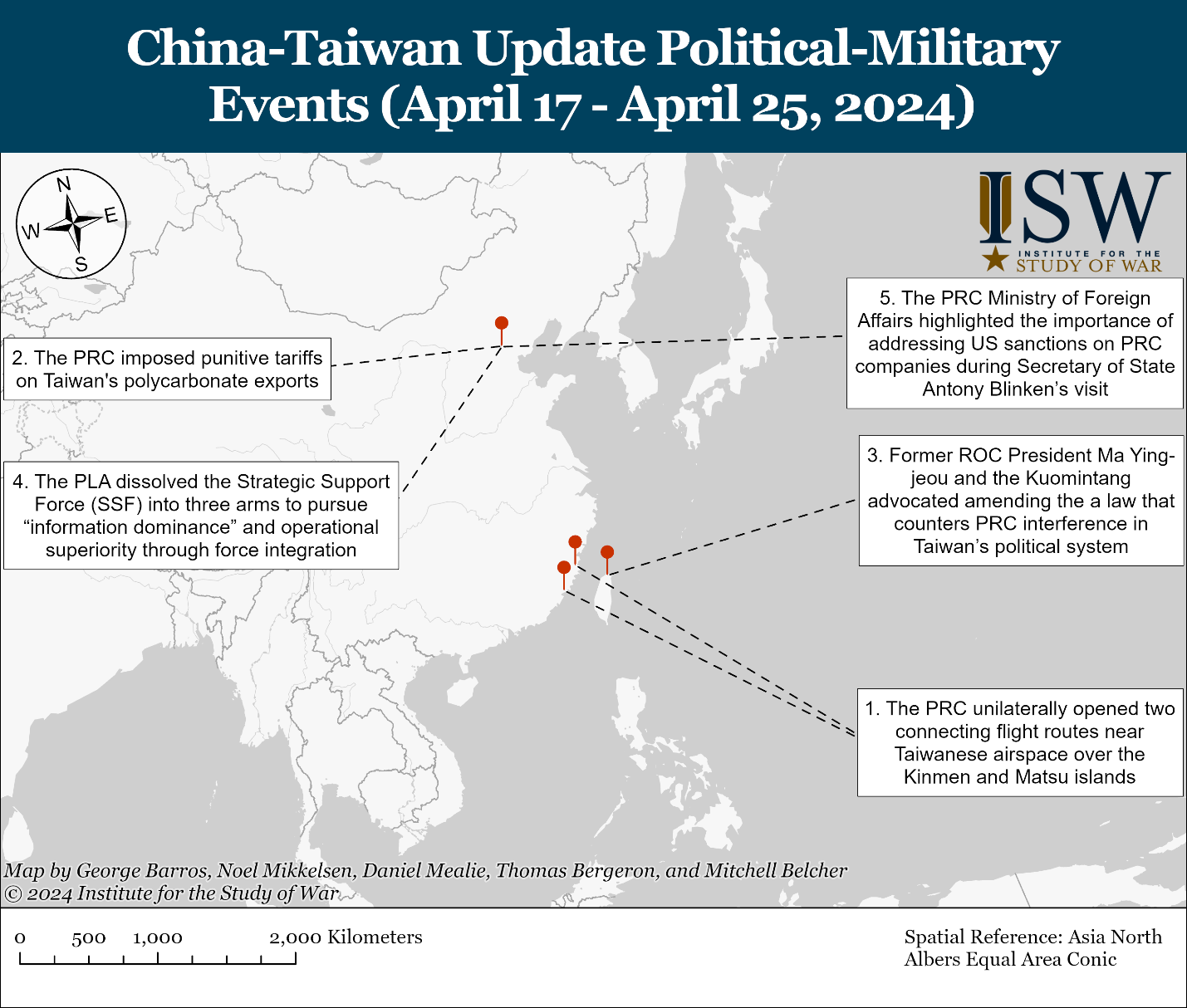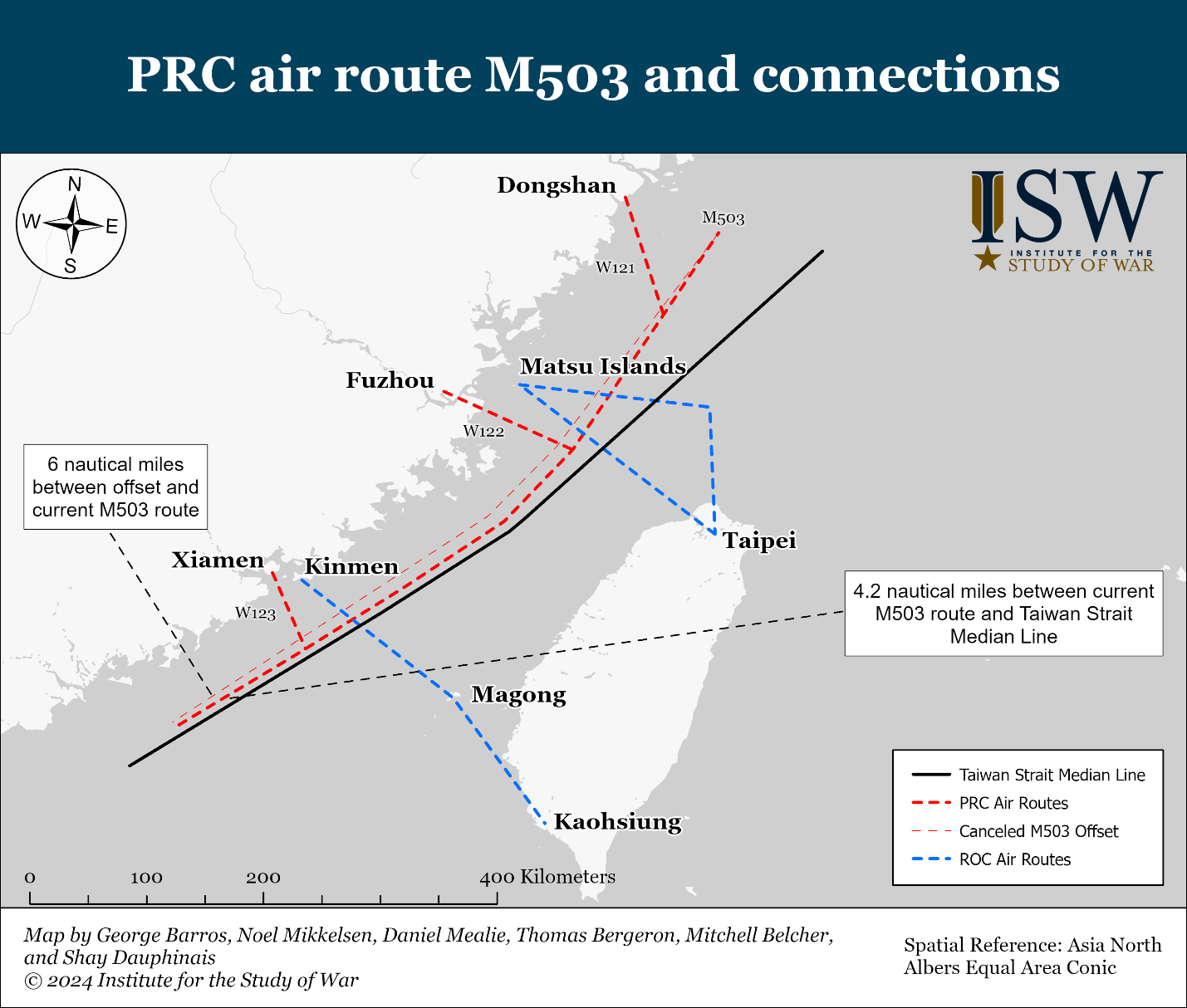{{currentView.title}}
April 26, 2024
China-Taiwan Weekly Update, April 26, 2024
Editors: Dan Blumenthal and Frederick W. Kagan of the American Enterprise Institute
Data Cutoff: April 25 at Noon ET
The China–Taiwan Weekly Update is a joint product from the Institute for the Study of War and the American Enterprise Institute. The update supports the ISW–AEI Coalition Defense of Taiwan project, which assesses Chinese campaigns against Taiwan, examines alternative strategies for the United States and its allies to deter the Chinese Communist Party’s (CCP) aggression, and—if necessary—defeat the People’s Liberation Army (PLA). The update focuses on the Chinese Communist Party’s paths to controlling Taiwan and cross–Taiwan Strait developments.
Key Takeaways
- The PRC unilaterally opened two eastbound connecting flight routes near Taiwanese airspace over the Kinmen and Matsu islands. The move is likely part of a CCP effort to strain Taiwan’s situational awareness around its airspace and put pressure on Taiwan’s incoming Lai Ching-te administration.
- PRC tariffs on Taiwan’s polycarbonate exports may be part of a pressure campaign ahead of Lai Ching-te’s presidential inauguration on May 20.
- Former ROC President Ma Ying-jeou met with Kuomintang Chairman Eric Chu on April 16 and discussed amending a law that counters PRC interference in Tawan’s politics.
- The People’s Liberation Army dissolved the Strategic Support Force into three distinct arms to achieve “information dominance” and operational superiority through force integration.
- The PRC Ministry of Foreign Affairs highlighted the importance of addressing United States sanctions on PRC companies during Secretary of State Antony Blinken’s visit to the PRC. The PRC framing of the visit indicates that the CCP aims to alleviate economic tension with the United States while maintaining commercial and defense industrial base assistance to Russia.
- The PRC Ministry of Foreign Affairs Spokesman Lin Jian framed the United States Army deploying the Typhon ground-based cruise missile and air-defense missile launcher to the Philippine island of Luzon as part of the US-Philippine Salaknib 2024 military exercise as “provoking conflict.”
Cross-Strait Relations
The PRC unilaterally opened two eastbound connecting flight routes near Taiwanese airspace over the Kinmen and Matsu islands. The move is likely part of a CCP effort to strain Taiwan’s situational awareness around its airspace and put pressure on Taiwan’s incoming Lai Ching-te administration. The flight routes, W122 and W123, have been operational in the westbound direction since 2018 and connect the PRC cities of Fuzhou and Xiamen to the M503 north-south flight route, which goes down the middle of the Taiwan Strait. The W122 route flies close to the Matsu islands and the W123 route flies near the Kinmen Islands, two island groups near the PRC that Taiwan controls. The PRC Civil Aviation Administration of China (CAAC) unilaterally canceled a 6 nautical mile “offset” of the M503 route in January 2024, which moved the route to within 4.2 nautical miles (5 miles or 7.8 kilometers) of the median line of the Taiwan Strait. It announced on the same day that it would permit eastbound flights along the W122 and W123 routes.[1] The CAAC finally launched the new eastbound flight routes on April 19. It claimed the new airspace “optimization” and the adjustment of the M503 route were needed to meet the “development needs” of air transportation between the Yangtze River Delta and the Guangdong-Hong Kong-Macao Bay Area and to ensure flight safety.[2]
Taiwan’s Civil Aviation Administration said both the establishment of the new flight routes and the “unilateral” adjustment of the M503 were a danger to air traffic in the area. It said it will request that aircraft turn around if they approach Taiwanese airspace without permission.[3] ROC Premier Chen Chien-jen condemned the new routes, called for them to be retracted, and directed the CAA to study possible response measures.[4] The PRC’s Taiwan Affairs Office (TAO) denied that there were any security concerns about the new flight routes and also denied the existence of a median line in the Taiwan Strait.[5]
An unnamed “senior Taiwan official” told Reuters the PRC’s flight adjustments were part of a pattern of pressure on Taiwan ahead of ROC Vice President Lai Ching-te’s inauguration as President on May 20. The official said the CCP wants Taiwan to “cave in, make compromises, and change [its] behavior.”[6] The CCP considers Lai and his political party, the Democratic Progressive Party (DPP), to be separatists. The timing of the air route changes is consistent with political motives. The CAAC originally announced the routes and the shifting of the M503 route on January 30, not long after Taiwan’s January 13 election. It activated the new routes on April 19, almost one month before Lai’s inauguration. Increasing the volume of flights in the sensitive airspace near Kinmen, Matsu, and the Taiwan Strait median line serves to strain Taiwanese resources as Taiwan must monitor, assess, and prepare to respond to each flight as a potential airspace incursion.
PRC tariffs on Taiwan’s polycarbonate exports may be part of a pressure campaign ahead of Lai Ching-te’s presidential inauguration on May 20. The PRC Ministry of Commerce (MOFCOM) announced on April 19 that it would levy tariffs of up to 22.4% on Taiwan’s polycarbonate exports to the PRC. Polycarbonate is a material used in many fields such as electronic appliances, sheets and films, automobiles, optics, packaging, medical devices, and safety equipment.[7] The tariffs resulted from MOFCOM concluding an anti-dumping investigation into Taiwanese polycarbonate products. MOFCOM first announced the investigation in November 2022 and released preliminary findings announced in August 2023 which claimed Taiwanese “dumping” of polycarbonate products had “substantially” damaged the PRC’s polycarbonate industry. The findings released on April 19 confirmed the conclusions from August.
ROC Executive Yuan spokesperson Lin Tze-luen accused the PRC of using “political manipulation” to interfere with normal cross-strait trade relations.[8] The TAO spokesperson claimed on April 24 that the anti-dumping investigation reached its conclusion “fairly and impartially” and fully complied with relevant laws and World Trade Organization regulations. The spokesperson threatened further economic measures against Taiwan “if the DPP authorities continue to stubbornly adhere to the ‘Taiwan independence’ stance,” however.[9]
The TAO statement and the timing of the tariff announcement are consistent with a politically motivated pressure campaign against Taiwan and the incoming administration of Lai Ching-te. The tariffs took effect on April 20, exactly one month before Lai’s presidential inauguration. MOFCOM’s announcement of the tariffs on April 19 also coincided with the CAAC announcing its new flight routes near Kinmen and Matsu. The PRC previously imposed punitive economic measures against Taiwanese chemical and fishery products before Taiwan’s January 13 election. It also claimed Taiwan’s trade restrictions on the PRC violated the 2011 Cross-Strait Economic Cooperation Framework Agreement (ECFA). ISW has assessed that these punitive economic measures may have been meant to influence Taiwan’s election.[10]
Taiwan
Former ROC President Ma Ying-jeou met with Kuomintang (KMT) Chairman Eric Chu on April 16 and discussed amending a law that counters PRC interference in Tawan’s political system. Ma, who is a member of the KMT, and the KMT leadership advocated amending some provisions of the law to prevent it from becoming a tool for DPP “manipulation” and to avoid “stifling the rights of Taiwanese people to exchange with the mainland.” They did not publicly specify what amendments they sought to make.[11] The Anti-Infiltration Act is a 2020 law that the DPP government passed to counter PRC interference in Taiwan’s elections and political system. It imposes criminal penalties for accepting funds from “hostile foreign forces” to make political donations and lobby the government. It also increases penalties for other election law violations if those violations are committed with funding from foreign forces.[12]
Ma and the KMT’s plans to propose amendments are consistent with their opposition to the law when originally passed. Ma at the time compared the law’s passage to a return to “martial law” in Taiwan, referring to the period of KMT authoritarian rule from 1949-1987 known as the “White Terror.”[13] The KMT boycotted the final vote on the law and criticized it as a ploy for the DPP to win votes shortly before the 2020 election. Some of the law’s critics said it was too broad and could be used to repress legitimate political activity and cross-strait exchanges.[14]
The PRC’s Taiwan Affairs Office (TAO) spokesperson on April 24 claimed the Anti-Infiltration Act is an “evil law” meant to suppress dissidents, create “Green Terror,” and seek the “selfish interests” of one party.[15] “Green Terror” is a term the CCP and other opponents of the DPP use to compare DPP policies with the repressive policies of the “White Terror.” Green is the DPP’s official color. The CCP’s rhetoric about the Anti-Infiltration Law is similar to that of Ma and some hardline KMT officials. The CCP prefers for the law to be abolished rather than amended, however.
The DPP said it would oppose former president Ma Ying-jeou and the Kuomintang’s proposed amendments to Taiwan’s Anti-Infiltration Act. ROC Vice President and President-elect Lai Ching-te said on April 17 that the KMT’s proposal appears to be harmful to Taiwan and regional stability. He said the Anti-Infiltration Act is designed to prevent malicious infiltration by foreign forces and does not hinder cross-strait exchanges.[16] DPP spokesperson Justin Wu said on April 23 that the DPP would oppose any loosening of the law. He raised suspicions about the timing of Ma and the KMT’s announcement, noting that it came shortly after Ma returned from his trip to the PRC on April 1-11. Wu also warned KMT legislative caucus whip Fu Kun-chi not to discuss domestic Taiwanese legislation during his planned trip to the PRC.[17] Fu will lead a KMT delegation to the PRC on April 25.[18]
The ROC Ministry of Foreign Affairs is investigating the leak of government documents and whether the documents were altered overseas before their public disclosure. The leaked documents dating from March 15 included reportedly official communications between the ROC Ministry of Foreign Affairs, the Keelung Customs Service, and the ROC National Treasury Administration approving a Hsiao Bi-khim request for the wine she imported for her personal consumption to be exempted from inspection. The documents were part of 4GB of data acquired by hackers.[19] The ROC MOFA did not confirm the authenticity of the leaked documents. It suspected the documents involved may have undergone “malicious overseas alteration” after being “sold on the dark web.”[20] The ROC Ministry of Foreign Affairs and the Ministry of Finance stated that the transfer of Hsiao Bi Khim’s personal belongings back to Taiwan occurred legally. [21] ROC Premier Chen Chien-jen stated that the accusations against Hsiao Bi-khim were an act of cognitive warfare and called on the public to maintain vigilance. [22]
China
The People’s Liberation Army (PLA) dissolved the Strategic Support Force (SSF) into three distinct arms to pursue “information dominance” and operational superiority through force integration. Xi created the SSF in 2015 during comprehensive military reforms, tasking it with integrating military operations across the cyber, electronic, and aerospace domains.[23] Former PLA Navy Rear Admiral Yin Zhuo stated in 2016 that SSF responsibilities included target detection and reconnaissance, relaying target information, management of BeiDou [navigation] satellites and space reconnaissance means, and conducting operations in cyberspace and the electromagnetic spectrum.[24] CCP General Secretary Xi Jinping announced the dissolution of the SSF and the inauguration of the Information Support Force (ISF) on April 19.[25] Ministry of National Defense (MND) spokesperson Wu Qian stated that an Aerospace Force and Cyberspace Force also came into existence alongside the ISF as a part of the restructuring.[26]
The three new arms are organized in the same support capacity as the preexisting Joint Logistics Support Force (JLSF), whose task is to unify logistics to support the five theater commands. The four auxiliary arms are distinct from the PLA’s four armed services, which are the Ground Forces, Navy, Air Force, and Rocket Force.
Xi described the new ISF as a key support for coordinating the development and application of “network information systems,” referring to mechanisms to facilitate information sharing and strengthen information infrastructure across the military.[27] Xi’s introduction indicates that the ISF will assume one of the SSF’s primary responsibilities, which includes what former SSF Commander Gao Jin referred to as acting as an “information umbrella” for the military to integrate operational capabilities.[28] This entails forming a data link to enable information transmission, processing, and distribution that is critical to the cohesion of joint operations.[29] This is consistent with PRC military doctrine, which emphasizes the importance of network-centric “informatized” warfare that exploits information sharing to achieve synergy across warfighting domains.[30] The PLA defines information dominance as gaining “superiority over an adversary in terms of information acquisition, transmission, processing, utilization, and confrontation capabilities.”[31] Information offense and defense are inherent to information dominance in the PLA’s view, requiring a blend of kinetic and non-kinetic means to influence, interfere with, degrade, and destroy the enemy’s information systems.[32]
The Aerospace Force and Cyberspace Force will likely take on the responsibilities of the SSF’s two functional units, the Aerospace and Network Systems Departments.[33] PRC officials have not indicated where responsibilities under the SSF’s broad remit would be reallocated, such as collecting intelligence, technical reconnaissance, electronic countermeasures, and psychological warfare.
The SSF’s division into three distinct organizations demonstrates the CCP leadership’s aim to streamline its various missions into separate individual arms to improve efficacy. The creation of a standalone ISF suggests that the SSF was inadequate to meet Xi’s standards for centralizing informatization in PLA operations. Xi appointed SSF Deputy Commander Bi Yi as ISF Commander and SSF Political Commissar Li Wei ISF Political Commissar.[34] Retaining top leadership roles such as Bi and Li suggests that the reason for the SSF’s dissolution was primarily functional and not due to endemic performance or trust issues throughout the command. The ISF’s placement under the direct command of the Central Military Commission affirms the centrality of information in military operations and maintains CCP leadership’s close supervision over the information chain.
The PRC Ministry of Foreign Affairs highlighted the importance of addressing United States sanctions on PRC companies during Secretary of State Antony Blinken’s visit to the PRC. The PRC framing of the visit indicates that the CCP aims to alleviate economic tension with the United States while maintaining commercial and defense industrial base assistance to Russia. Blinken met with party officials in Shanghai on April 24 before traveling to Beijing to meet with PRC Foreign Minister Wang Yi on April 26.[35] The head of the MFA’s North America and Oceania Division Yang Tao announced the PRC’s main goals for Blinken’s visit during a briefing on April 23 are: 1) establishing the right perception; 2) strengthening dialogue; 3) effectively managing disagreements; 4) promoting mutually beneficial cooperation; and 5) jointly assume responsibilities as major countries. The establishment of right perception refers to making the United States not contest fundamental economic and political disagreements with the PRC over sensitive issues like CCP regime stability and Taiwan. Yang claimed that the United States has intensified measures to suppress the PRC’s economy, trade, science, and technology with sanctions. Yang denied the PRC’s responsibility for the crisis in Ukraine and urged the United States to immediately stop “indiscriminately imposing unilateral sanctions on Chinese companies and individuals.” Yang also noted “negative developments” regarding the United States’ security cooperation with the Philippines, Australia, and Japan. [36]
A senior unnamed State Department official outlined the issues that Blinken will focus on during a briefing on April 19, which included US concerns about PRC businesses’ transfers of dual-use materials and weapons components to Russia that Russia is using to advance its military production. The State Department official stated the United States’ concern that through Chinese support, Russia has reconstituted its defense industrial base and is therefore reinforcing the threat to Ukraine on the battlefield and European security writ large. Blinken called the PRC the primary contributor to Russia’s defense industrial base on April 19 during the Group of Seven (G7) summit in Italy.[37]
Southeast Asia
Philippines
The PRC Ministry of Foreign Affairs Spokesman Lin Jian framed the United States Army deploying the Typhon ground-based cruise missile and air-defense missile launcher to the Philippine island of Luzon as part of the US-Philippine Salaknib 2024 military exercise as “provoking conflict.” The United States Army stated this is the first time it deployed the Typhoon to the Philippines.[38] Lin claimed that the deployment “aggravated regional tensions” and urged the Philippines to be aware of the unspecified “serious consequences of catering to the US.”[39]
Russia
The Chinese Coast Guard (CCG) began implementing expanded cooperation with the Border Guard Bureau Service of the Russian Federal Security Service (FSB). The CCG held working-level talks with the FSB in Vladivostok from April 16 to 18 for the first time since the signing of the April 2023 memorandum of understanding between the two services. The meetings involved tabletop exercises and seminars.[40] The April 2023 memorandum stated that the CCG and FSB would strengthen maritime law enforcement.[41]
[1] https://www.understandingwar.org/backgrounder/china-taiwan-weekly-update-february-15-2024
https://www.scmp dot com/news/china/politics/article/3250431/beijings-changes-civil-flight-path-near-taiwan-strait-median-line-likely-squeeze-islands-air-defence
[2] https://www.caac.gov dot cn/XWZX/MHYW/202404/t20240419_223911.html
[3] https://www.caa.gov dot tw/NewsPublish-Content.aspx?lang=1&nid=2304&a=381&ssd=2023/04/24&sed=2024/04/24&title=&ngid=1
[4] https://news.ltn dot com.tw/news/politics/breakingnews/4646659
[5] http://www.gwytb dot gov.cn/xwdt/xwfb/xwfbh/202404/t20240424_12615808.htm
[6] https://www.reuters.com/world/asia-pacific/china-opens-new-air-routes-near-taiwanese-islands-2024-04-19/
[7] http://www.mofcom dot gov.cn/article/zwgk/gkzcfb/202404/20240403504309.shtml
[8] https://udn dot com/news/story/6656/7910822?from=udn-catelistnews_ch2
[9] http://www.gwytb dot gov.cn/xwdt/xwfb/xwfbh/202404/t20240424_12615808.htm
[10] https://www.understandingwar.org/backgrounder/china-taiwan-weekly-update-december-21-2023
https://www.understandingwar.org/backgrounder/china-taiwan-weekly-update-january-11-2024
[11] https://udn dot com/news/story/6656/7902299
[12] https://law.moj dot gov.tw/LawClass/LawAll.aspx?pcode=A0030317
[13] https://www.taipeitimes dot com/News/taiwan/archives/2020/01/02/2003728594
[14] https://thediplomat.com/2020/01/taiwan-passes-anti-infiltration-act-ahead-of-election-amid-opposition-protests/
https://www.reuters.com/article/us-taiwan-lawmaking-idUSKBN1YZ0F6/
[15] http://www.gwytb dot gov.cn/xwdt/xwfb/xwfbh/202404/t20240424_12615808.htm
[16] https://www.cna dot com.tw/news/aipl/202404170268.aspx
[17] https://www.cna dot com.tw/news/aipl/202404220127.aspx
https://www.taiwannews dot com.tw/news/5670761
[18] https://news.tvbs dot com.tw/english/2465640
[19] https://www.taipeitimes dot com/News/taiwan/archives/2024/04/23/2003816827
[20] https://www.mofa dot gov.tw/News_Content.aspx?n=95&s=117168
[21] https://www.mofa dot gov.tw/News_Content.aspx?n=95&s=117168
https://news.ltn dot com.tw/news/politics/paper/1642098
[22] https://news.ltn dot com.tw/news/politics/breakingnews/4648808
[23] http://news.cctv dot com/2016/08/30/ARTI2Xi1zgynCfj6TYsecOcb160830.shtml
https://mil.huanqiu dot com/article/9CaKrnJTdfI
[24] http://military.people dot com.cn/n1/2016/0105/c1011-28011251.html
[25] https://www.gov dot cn/yaowen/liebiao/202404/content_6946295.htm
[26] http://www.mod dot gov.cn/gfbw/qwfb/16302054.html
[27] https://www.nids.mod.go.jp/publication/chinareport/pdf/china_report_EN_web_2022_A01.pdf
[28] http://www.cssn dot cn/jsx/jsjj_jsx/201601/t20160114_2826914.shtml
[29] http://news.cctv dot com/2016/08/30/ARTI2Xi1zgynCfj6TYsecOcb160830.shtml
[30] https://www.understandingwar.org/sites/default/files/Russia%20and%20China%20Look%20at%20the%20Future%20of%20War_0.pdf
[31] http://military dot people.com.cn/n/2015/0317/c172467-26702265.html
[32] http://military dot people.com.cn/n/2015/0317/c172467-26702265.html
[33] http://www.mod dot gov.cn/gfbw/qwfb/16302054.html
[35] https://www.reuters.com/world/blinken-meet-businesses-shanghai-he-kicks-off-tough-china-trip-2024-04-25/
[36] http://www.news dot cn/world/20240423/c475aac580a444cb8ed4ecfecc6b95e7/c.html
[37] https://www.state.gov/secretary-antony-j-blinken-at-a-solo-press-availability-2/
[38] https://www.army.mil/article/275333/us_armys_mid_range_capability_makes_its_first_deployment_in_the_philippines_for_salaknib_24
https://www.navalnews.com/naval-news/2024/04/u-s-army-deploys-new-missile-launcher-to-the-philippines/
[39] https://www.mfa.gov.cn/web/wjdt_674879/fyrbt_674889/202404/t20240418_11284201.shtml
[40] http://www.81 dot cn/yw_208727/16301719.html
[41] https://www.ccg dot gov.cn/mhenu/2023/international_0427/86.html#:~:text=On%20April%2024%20and%2025,FSB%20maritime%20law%20enforcement%20cooperation.



